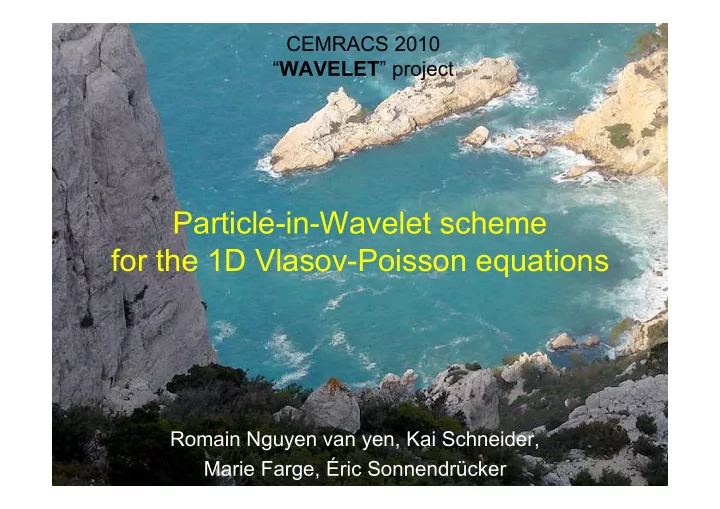

CEMRACS 2010 “ WAVELET ” project Particle-in-Wavelet scheme for the 1D Vlasov-Poisson equations Romain Nguyen van yen, Kai Schneider, Marie Farge, Éric Sonnendrücker
Outline • Description of the scheme: – density estimation, – Poisson solver, – particle push. • Test cases: – Landau damping, – two-streams instability.
Step 1 density estimation
Density estimation • Goal: estimate a smooth probability density function from N independent realizations Kernel method Particle-in-Cell code
Empirical wavelet coefficients Empirical density function = sum of Dirac distributions particle positions Empirical wavelet coefficients := coefficients of
j=5 j=4 R-Coiflet 1 scaling functions
Empirical wavelet coefficients Problem: we need to compute There is no analytical expression. Proposed solution: use a lookup table ! initialized before the start of the computation. + interpolation by 2nd order Lagrange polynomials. Cost proportional to N x S (S=6) This is probably not optimal…
Wavelet based density estimation coarse scale approximation details
Wavelet based density estimation Denoising = setting to zero small wavelet coefficients ( thresholding ) + setting to zero fine scale wavelet coefficients (linear filtering, uniform smoothing)
Choice of parameters COARSE SCALES INTERMEDIATE SCALES FINE SCALES keep all nonlinear threshold discard all L J keep only coefficients such that: In this presentation we shall only consider linear thresholding , so we impose L = J
Choice of parameters COARSE SCALES FINE SCALES keep all discard all J In this presentation we shall only consider linear thresholding , so we impose L = J
Step 2 Poisson solver
Galerkin discretization • We adopt a Galerkin discretization of the Laplace operator in the scaling function basis at the finest resolved scale, � L � = 1 � � • L is a circulating matrix, equivalent to applying a finite difference operators to the scaling function coefficients.
Inversion • For inversion we use the conjugate gradient method, • We use a diagonal preconditioner in wavelet space : the number of iterations is almost independent on resolution.
Step 3 Particle push
Electric field derivation • Galerkin projection of the gradient operator in the scaling function basis, E = � G � • As before, equivalent to finite difference operator. • (L symmetric + G antisymmetric + LG=GL) => no self forces
Electric field interpolation • Interpolation using the same lookup- table method as for the density estimation step. • Time discretization using 3rd order Runge-Kutta
Test cases
Reference and competitor • reference solutions obtained using semi-Lagrangian semi-Lagrangian solver – 3rd order spline interpolation – grid size 2049 2 • competing solutions obtained with classical PIC IC solver – triangular charge assignment function • VLASY platform much appreciated.
Landau damping
Landau damping: convergence L 2 error on the electric field at t = 20
Two-streams instability snapshots of reference solution t = 10 t = 30
Two-streams instability Time evolution of electrostatic energy
Two-streams instability: convergence L 2 error on the electric field at t = 10
Two-streams instability Movie of electric field from t = 0 to t = 30
Two-streams instability: denoising t = 30 Error on the electric field as a function of x
Two-streams instability: denoising t = 30 Yes, this can be denoised !
Two-streams instability: denoising t = 30 Yes, this can be denoised !
Conclusion Particle-in-Wavelet scheme proposed and successfully implemented in 1D, Without denoising, behaves like a high order PIC scheme, Improvement expected with denoising, but not tested yet.
Perspectives ⇒ Convergence studies with nonlinear thresholding, ⇒ Adaptivity, 2D version, ⇒ Biggest issue: we cannot get rid of large scale noise! – Hybrid approach: Eulerian Wavelet- Galerkin for the coarse scales, PIW for fine scales ?
Thank you ! and thanks to Matthieu Haefele and all CEMRACS organizers An alpha version of the Kicksey-Winsey C++ platform is available online under the GNU GPL. Visit http://justpmf.com/romain and do not hesitate to ask me. The reference for WBDE is: JCP 229 , p. 2821 (2010)
Recommend
More recommend